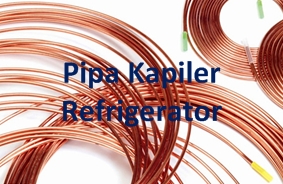Capillary Pipe Effects Too Long
Capillary Pipe Effects Too Long; Capillary tube is also called: Impedance tube, Restrictor tube or choke tube. The refrigerant rate control system in the simplest refrigeration system is a capillary tube. As the name suggests, the capillary tube consists of a pipe with a very small diameter. The diameter of the capillary tube is generally between 0.26 in to 0.4 inch depending on the size of the system capacity. Figure shows a refrigeration system with a capillary tube.
At a certain length and
diameter, the capillary tube has a fairly high frictional resistance so that it
can reduce high condensation pressures to low evaporation pressures. The
capillary tube functions to regulate the amount of liquid refrigerant that enters
the evaporator and to keep the pressure difference between the condensing
pressure and the evaporation pressure constant.
Because the capillary tube
is connected in series in the refrigeration system, the size of the liquid
refrigerant distribution capacity produced by the capillary tube must be
adjusted to the compression capacity of the compressor used. Therefore, to
obtain high efficiency, the capacity of the capillary tube must be adjusted to
the compression capacity of the compressor.
In the capillary tube there
is a relationship between the diameter of the pipe and the length of the pipe
to the frictional resistance of the refrigerant. Here is a description of the
relationship.
1. The larger the diameter, the smaller the resistance.
2. The smaller the diameter, the greater the resistance.
3. The longer the capillary tube, the greater the
resistance.
4. The shorter the capillary tube, the smaller the
resistance.
Then what are the consequences if the capillary tube is too long or too short. Here's the explanation.
Consequences of Too Long Capillary Pipe
If the frictional resistance
of the capillary tube is too large, because the capillary tube is too long or
the diameter is too small, the capacity of the pipe to deliver liquid
refrigerant from the condenser to the evaporator is smaller than the
compression capacity. As a result, the evaporator lacks liquid refrigerant, the
pressure will drop. On the other hand, the liquid refrigerant in the condenser
increases, so the condensation pressure will also increase. This large
condenser pressure makes the compressor work which will make the compressor
overheat. This will shorten the compressor life.
Consequences of Too Short Capillary
Tubes
On the other hand, if the
frictional resistance of the capillary tube is too small, because the capillary
tube is too short or the diameter is too large, then the capacity of the pipe
to deliver liquid refrigerant from the condenser to the evaporator is greater
than the compression capacity. As a result, the evaporator has an excess of
liquid refrigerant, the pressure increases. Not all liquid refrigerant can
evaporate in the evaporator. Liquid refrigerant will enter the compressor which
can damage the compressor itself.


Tidak ada komentar:
Posting Komentar
Tulis komentar dengan bijak tanpa unsur SARA, Politik, dan Pornografi.